How Is This Race Even Close? It's All About The Vibes
How can Biden overcome voters' persistent disconnect between their feelings and the facts?
How is this election even close!?
It’s a common refrain among many on the left as polls between Biden and Trump remain stubbornly tight as we barrel toward Election Day just over 5 months from now.
With Trump’s election interference trial in the headlines and three other criminal trials pending, and with Trump bragging about overturning Roe v Wade, threatening to restrict access to contraceptives, going on bizarre tangents like mourning the “death” of Hannibal Lecter, it shouldn’t even be a contest, right?
Yet Trump is inexplicably tied or ahead in some national polls and many battleground state polls, and his favorability rating is higher than Biden’s.
Perhaps even more maddeningly, a recent ABC/Ipsos poll found that Trump is more trusted than Biden on the economy by a 46%-32% margin. This is absurd, of course, given that Trump’s presidency ended with an economic catastrophe while Biden has overseen a post-pandemic economic recovery exceeding all expectations, not to mention that of any other developed nation.
But in modern politics, it appears facts are increasingly irrelevant. Yes, in 2024, it’s all about the “vibes.”
Time Magazine broke down this “vibes theory” back in 2022 in a profile of then-Senate hopeful John Fetterman:
You might call it the Vibes Theory of Politics. The people who decide elections, Fetterman thinks, don’t obsessively follow the polls or listen to wonky podcasts. They vote based on vibes.
As Time explains it, a politician’s vibe is
the general impression they make on a normal person who isn’t paying close attention. (Which is, of course, the vast majority of Americans.) Your vibe is what people who don’t think about politics think about you.
This tracks with an April NBC News poll, which found that for folks who don’t follow any political news…Trump’s their guy.
Trump is the vibes candidate. And that explains a lot.
But it’s one thing to be a low-information voter and quite another to have an opinion that flies completely in the face of reality, which is what appears to be precisely the phenomenon keeping Trump’s numbers bizarrely elevated.
After all, a politician’s vibe can—and often does—comport with reality, or at least a kernel of truth. But in the era of Trump, who thrives on spinning his own fictional realities, shamelessly projecting a persona at odds with observable reality, the vibes theory of politics has been turned on its head, allowing reality to be completely subjugated to whatever feels true.
In today’s piece, I’ll dig into some of the ways the American people are getting it wrong and how Republican politicians are exploiting that disconnect. And I’ll try to get to the bottom of why what people feel is so at odds with reality.
“We all know…”
The most egregious recent example of a Republican politician really leaning into baseless vibes is Speaker Mike Johnson’s speech two weeks ago. Johnson announced the introduction of a new bill that would bar undocumented immigrants from voting in federal elections.
The ridiculous claim that Democrats want an open border to allow undocumented people into the country in order to vote in our elections has become an article of faith among many on the conspiracy-minded right. Notable adherents include Elon Musk, who touts the theory on his X account as though it’s true.
The fact is, not only has voting by noncitizens been a federal crime since 1996, but there is simply no evidence that it is even a small problem, let alone an epidemic requiring new federal legislation.
Remarkably, Johnson essentially admitted as much in his speech, saying
“We all know, intuitively, that a lot of illegals are voting in federal elections. But it’s not been something that is easily provable. We don’t have that number.”
It feels true, therefore it is.
But contrary to Johnson’s claim, the data on noncitizen voting does in fact exist.
According to The Hill:
“Well, the thing is, we actually do have the numbers, and we know that noncitizens don’t vote illegally in detectable numbers, let alone in large numbers,” said Eliza Sweren-Becker, a senior counsel in the Voting Rights & Elections Program at the Brennan Center for Justice, pointing to a study reviewing data from 42 different jurisdictions.
“The Brennan Center study from the 2016 general election showed an estimated 30 incidents of suspected — not confirmed — noncitizen votes out of 23.5 million, which is 0.0001 percent of the votes cast.”
She concluded:
“So the Speaker’s intuition is incorrect.”
You don’t say.
The Trump Effect
It’s no accident that Johnson first unveiled his crusade against noncitizen voting back in April at Mar-a-Lago at a joint “election integrity” press conference with Donald Trump. The fever dream of mass voting by undocumented immigrants has been a bogeyman of Trump’s for years, ever since he blamed illegal voting by noncitizens for his loss in the 2016 popular vote.
And now he’s gotten “the 2020 was stolen crew” back together to advance the false claim that noncitizen voting is rampant, laying the groundwork to call the 2024 election results into question.
It’s absurdly predictable at this point.
Because for Trump, projecting his own preferred version of reality and ignoring what’s true (yet inconvenient) comes as naturally to him as breathing.
Take his reaction to being told by Time’s Eric Cortellessa that the crime rate in the U.S. is down.
Okay, sir. Violent crime is going down throughout the country. There was a 6% drop in—
Trump: I don't believe it.
You don’t believe that?
Trump: Yeah, they’re fake numbers.
You think so?
Trump: Well it came out last night. The FBI gave fake numbers.
I didn't see that, but the FBI said that there was a 13% drop in 2023. [Editor's note: This statistic refers specifically to homicides.]
Trump: I don’t believe it. No, it’s a lie. It’s fake news.
Sir, these numbers are collected by state and local police departments across the country. Most of them support you. Are they wrong?
Trump: Yeah. Last night. Well, maybe, maybe not. The FBI fudged the numbers and other people fudged numbers. There is no way that crime went down over the last year. There's no way because you have migrant crime. Are they adding migrant crime? Or do they consider that a different form of crime?
So these local police departments are wrong?
Trump: I don't believe it's from the local police. What I saw was the FBI was giving false numbers.
The “law and order” guy claiming law enforcement cooks their numbers is peak 2024.
Contrary to Trump’s claims, of course, the data is clear: Cortellessa is right, crime is down. According to Pew, both property and violent crime has dropped precipitously from 1993-2022. And the latest murder rate data from 2023 shows a steep decline after a Covid-era spike.
But echoing Trump, Americans apparently don’t feel like it’s down.
A recent Pew poll found that, despite crime rates dropping, 58% of Americans now say reducing levels of crime should be a top priority for the president. That’s up from 47% since Biden came into office in 2021!
Crime is hardly the only issue where there is such a sharp disconnect between sentiment and reality.
Even on abortion, a recent New York Times/Siena poll of battleground states found that, remarkably, 17% of voters believe Joe Biden is responsible for overturning Roe v Wade, including 12% of Democrats.
According to The Times, one Georgia voter who supports abortion rights
said she was under the impression that Mr. Biden was responsible because it happened during his presidency, and she believed his age prevented him from closely tracking such events.
Vibes.
But nowhere is the disconnect more apparent than on the economy.
The “Vibecession”
In April, CNBC reported on the candidates’ two opposing views of the economy.
Biden’s:
“America has the best economy in the world,” he told NBC’s “TODAY” on Monday, laying out an argument that is central to his reelection campaign.
And Trump’s:
“We are a nation whose economy is collapsing into a cesspool of ruin, whose supply chain is broken, whose stores are not stocked, whose deliveries are not coming,” Trump shouted at a Georgia rally last month.
Only one of these portraits is accurate, as CNBC fact-checked:
But the numbers paint a different picture, one more in line with Biden’s narrative of American economic dominance than Trump’s apocalyptic warnings…
U.S. gross domestic product grew 2.5% in 2023, significantly outpacing that of other developed economies, according to a January report from the International Monetary Fund…
“The U.S. economy is leading the way for the global economy. It’s driving the global economic train,” Moody’s chief economist Mark Zandi told CNBC.
And this was all before inflation eased to the lowest level since the pandemic and we saw unemployment under 4% for a 27th consecutive month, a record not seen since the 1960s.
Yet again, if you ask Americans, they don’t seem to be feeling it.
A new Harris poll conducted for The Guardian is particularly mind-exploding.
As Atlantic writer Derek Thompson lays it out:
As The Guardian puts it:
So even though economic data, like GDP, implies strength in the economy, there’s a stubborn gap between the reality represented in that data – what economists use to gauge the economy’s health – and the emotional reality that underlies how Americans feel about the economy. In the poll, 55% think the economy is only getting worse.
So, what’s causing this disconnect?
Certainly, a large part can be attributed to right-wing media and negative partisanship. This poll’s responses are largely along partisan lines, with Republicans and Independents more likely to resist acknowledging the positive realities of the economy.
Yet, even Democratic respondents in this poll are under the impression that inflation is rising, which it verifiably is not.
And to be fair, each time there is a positive GDP or jobs report, Fox News and Fox Business tend to report on it, glum faces and all. And even Donald Trump acknowledges the reality of the stock market surging, even though he credits himself somehow for it.
So, is it social media’s fault? Certainly, disinformation is pervasive on social media, and a recently published study by Stanford reserachers found that in 2020, among a subset of 35,000 people who shut off Facebook and Instagram in the six weeks ahead of the election, there was a slight “unverified impact” toward Biden, “the equivalent of 1.3% of Trump voters’ swinging to Biden.”
But in the end:
The researchers found that staying off the two social media apps, both part of parent company Meta, had nearly zero effect — at least in the short term — on how people viewed the candidates, whether they turned out to vote and how they perceived the legitimacy of the election.
Many on the left blame Democratic messaging and the media for not getting the message out. But that would seem to presume that all that is needed to change people’s feelings about the economy, or any other issue for that matter, is getting the right information to the right people.
Changing hearts and minds is more complicated than that, as economics writer Kyla Scanlon pointed out in her 2022 piece that tried to square what she was seeing as this disconnect between improving economic indicators and a persistent pessimism among Americans.
She called it the “vibecession,” and it seems as relevant today as it did then.
As she writes:
Reality and Truth: As shown above, there is an element of reality to our existence - policy decisions, manufacturing output, gas prices, etc, [that] cannot be modified by our feeble human minds (at least right now) - it is capital-T-Truth in the Present Moment, whether we like it or not.
The Interpretation of Reality and Truth: But all of those things generate vibes (scientifically speaking) that do most of the work in determining how we feel.
And How You Feel compounds into How Everyone Feels, and that is consumer sentiment.
And in the end:
The overwhelming nature of it all creates a Vibecession. Where economically speaking, things are okay-ish but in reality… the vibes are off. People are feeling bad.
Vibecession - a period of temporary vibe decline where economic data such as trade and industrial activity are relatively okayish
The term was even added to dictionary.com last year, defined as:
The term vibecession is used to refer to a time when the economy is relatively good according to financial data and statistics, but the public is pessimistic about the current or future economic situation.
Which feels like a definition that applies to myriad issues beyond just the economy.
As The Wall St. Journal says in their analysis of a recent poll demonstrating this very phenomenon:
When it comes to the economy, the vibes are at war with the facts, and the vibes are winning. This is obviously bad news for President Biden’s re-election hopes. He can’t exactly tell voters that they are wrong; he would be called out of touch. And it probably wouldn’t change anything. The vibes seem symptomatic of a broader pessimism disconnected from the data.
The WSJ’s Greg Ip tried to explain it another way:
I suspect a lot of pessimism about the economy is “referred pain.” Just as one part of your body can hurt because of injury to another, pessimism about the economy may reflect dissatisfaction with the country as a whole. Lately, there has been a lot to be dissatisfied about: intensifying political and cultural conflict and intolerance, the pandemic, the border, mass shootings, crime, war in Ukraine and now the war in the Middle East.
Looked at through this lens, perhaps it’s rational for Americans to blame how they feel broadly on the person in power. And perhaps Americans’ stubborn support for Donald Trump is simply a deep-seated nostalgia for a time when they didn’t feel this way. As though support for Trump is a sort of time machine back to a simpler time.
Who wants to tell them, that’s not how any of this works?
Closing The Vibes/Reality Gap
It’s clear that one aspect of the economy that is causing enduring pessimism and a persistent disconnect between data and sentiment is consumer prices, a sort of “inflation hangover” as Working America puts it. Even though the data says inflation is coming down, that doesn’t mean prices are, only the rate at which they increase. And how many businesses are actually going to bring down their prices after Americans have continued to pay them?
The Biden administration understands the importance of reducing costs for Americans, which is why they have decided to release 1 million barrels of oil from strategic reserves between Memorial Day and July 4 to ease gas prices this summer.
It’s also why the administration has focused like a laser on reducing health care costs, including prescription drug prices for seniors.
And in fact, if there’s one bright spot, it appears that people are much less pessimistic about their own economic situation than they are about the country at large.
According to The Federal Reserve Survey Of Economic Well-Being:
This is echoed by Greg Ip in the WSJ:
Still, there is evidence people actually do notice things getting better around them. Surveys by the University of Michigan, for example, find consumer confidence has risen.
Moreover, while respondents rate the national economy as bad by a significant margin, they rate their own state’s economy as good by almost as much.
This is reminiscent of how voters tend to assign low marks to Congress but high marks to their own representatives.
The challenge for the Biden team, even as more recent consumer confidence data shows a backslide, is to make Americans feel that the improvements they see in their own lives at the micro level are thanks to the President and his policies.
The objective truth is that Biden’s policies are benefiting Americans every day, while Trump’s will harm them.
We need to make sure that, come November, most Americans believe it.
If you’ve been meaning to support our work by becoming a paid subscriber, now’s a great time!

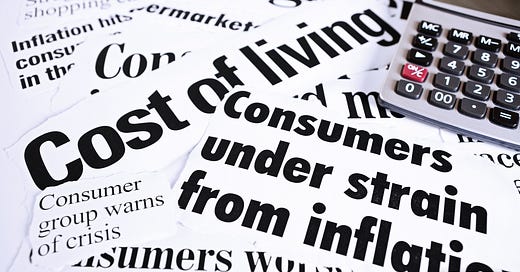




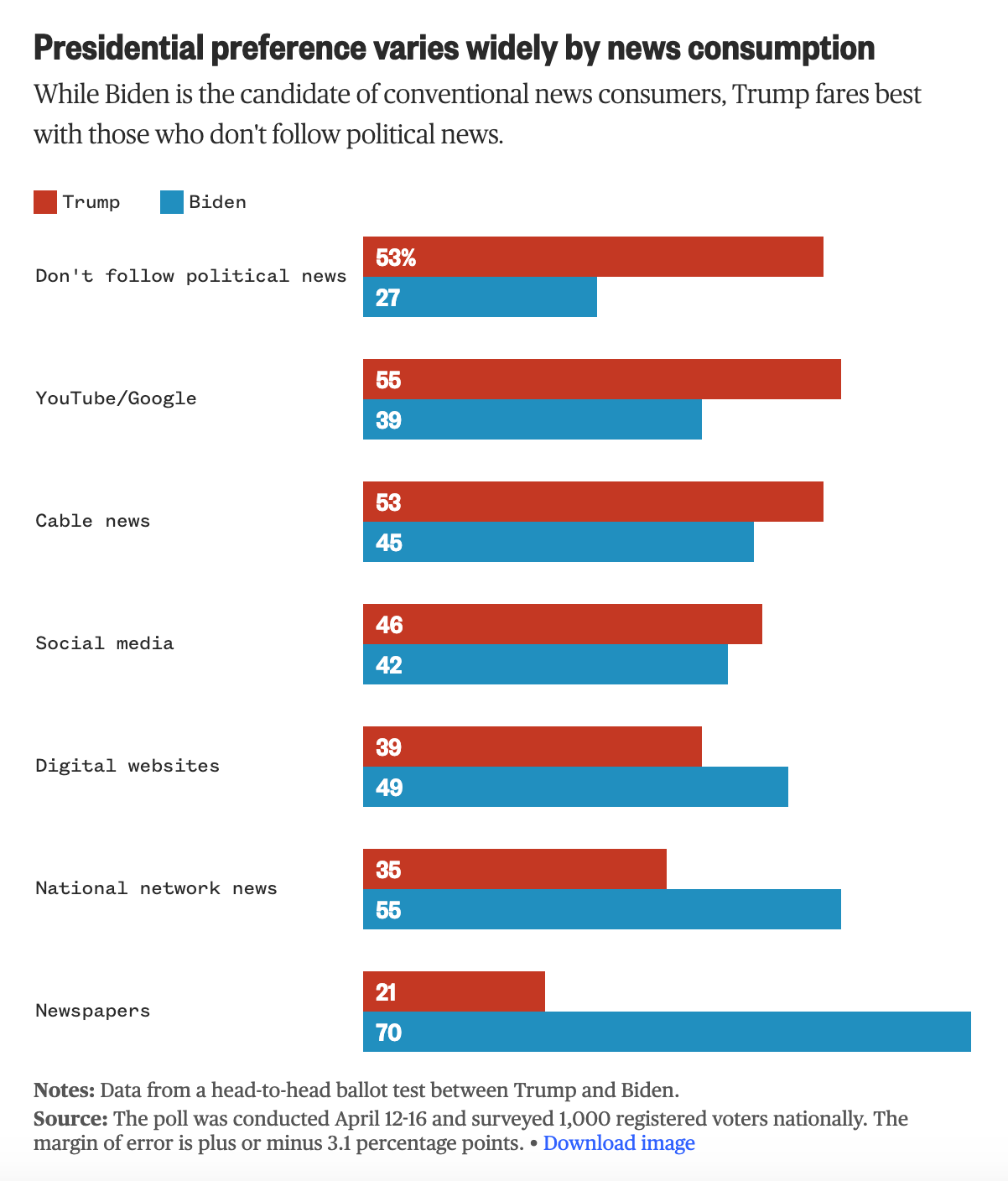
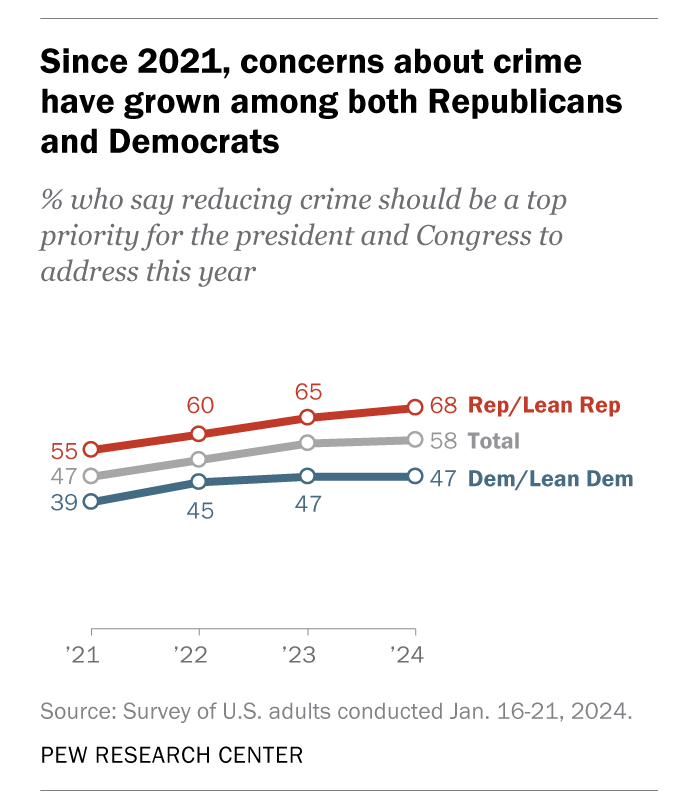
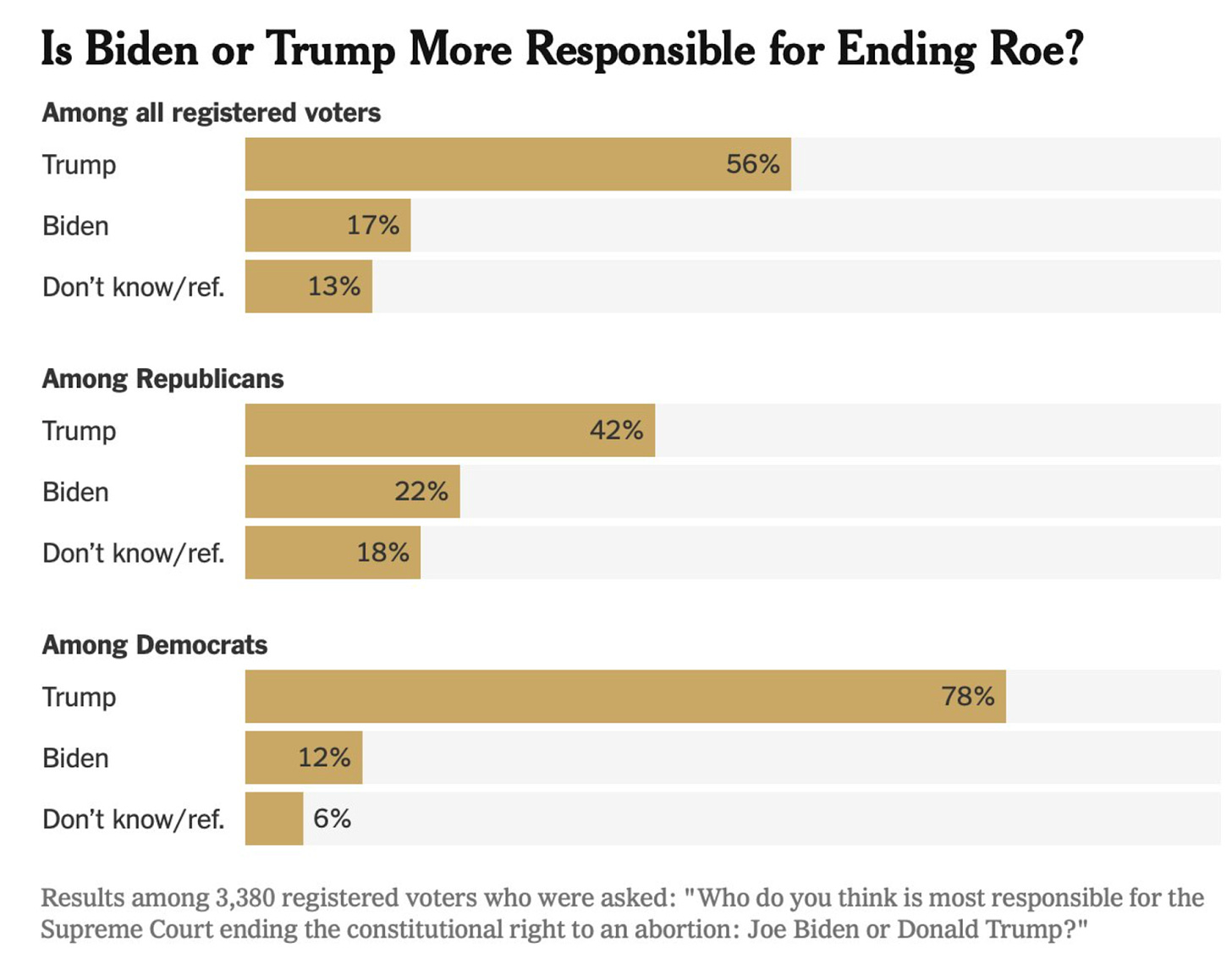
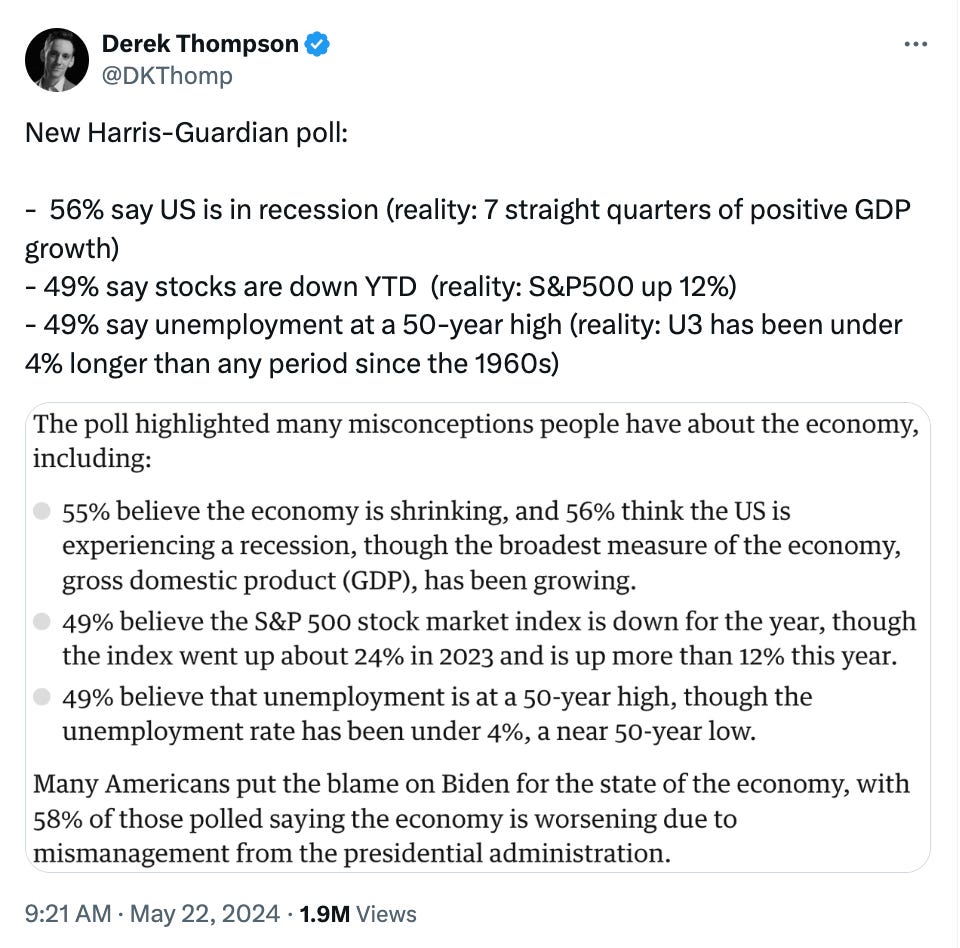


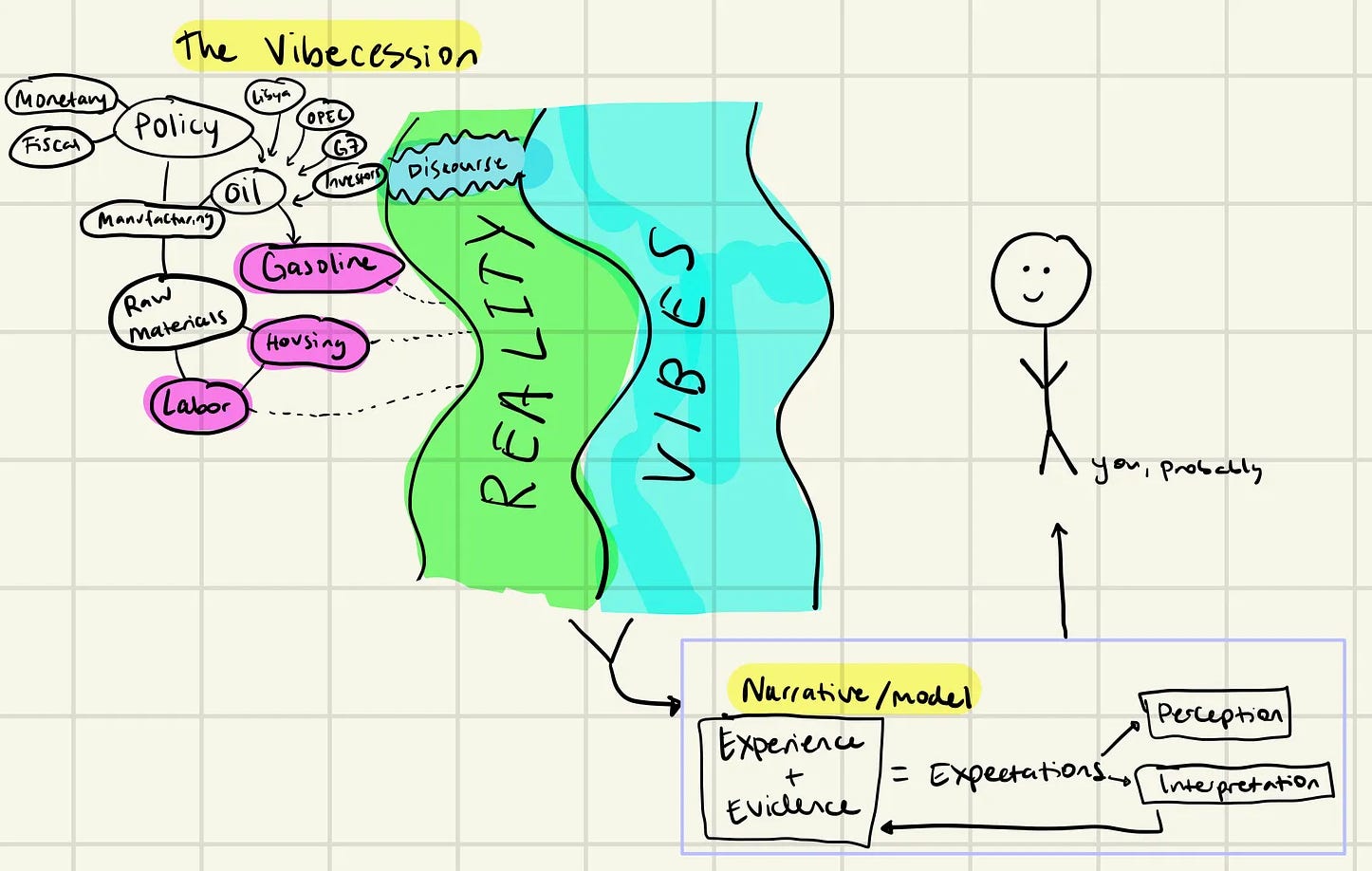
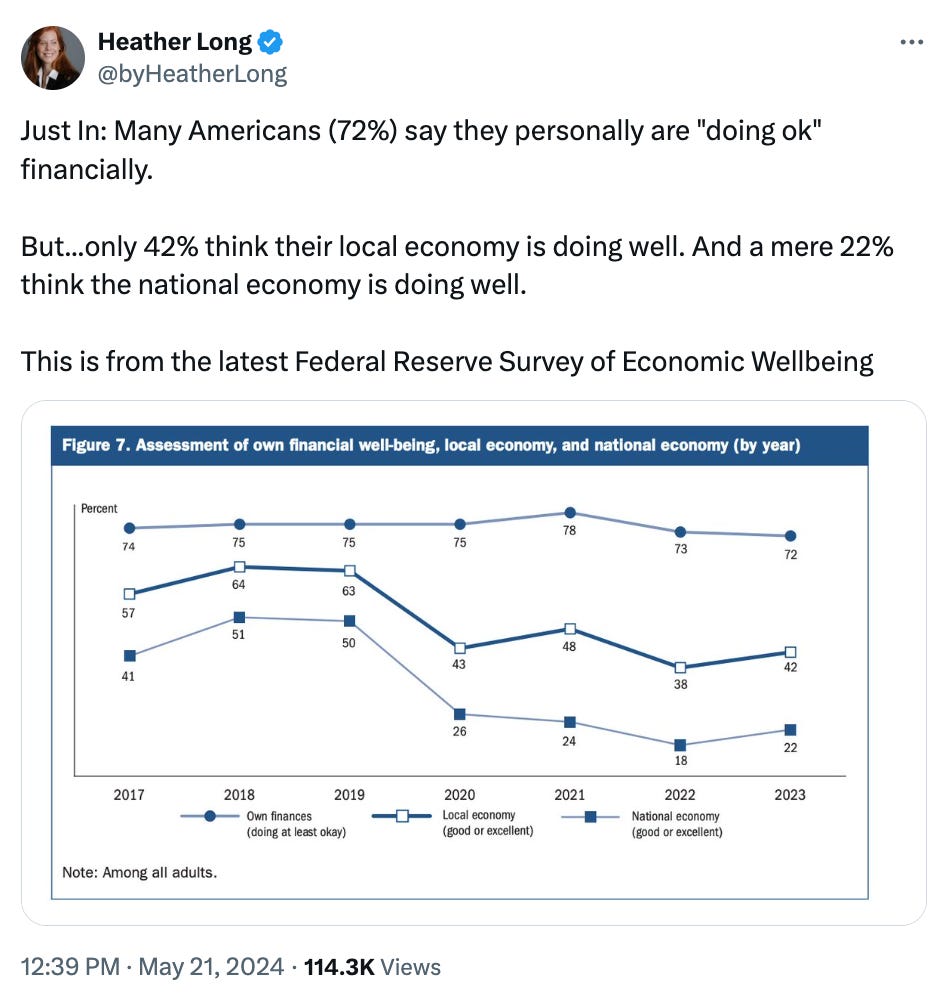
This is becoming more and more indicative of how fucking stupid the vast majority of Americans are. They will get the fascist government they deserve.
It's just wild how badly even the people who identify as Democrats get it. This isn't just propaganda from right wing media, it's ignorance of the facts by all manner of Americans. The statistics on people's perception of unemployment is just mind-blowing... And the 12% of Democrats who think Biden is responsible for ending Roe is even worse.